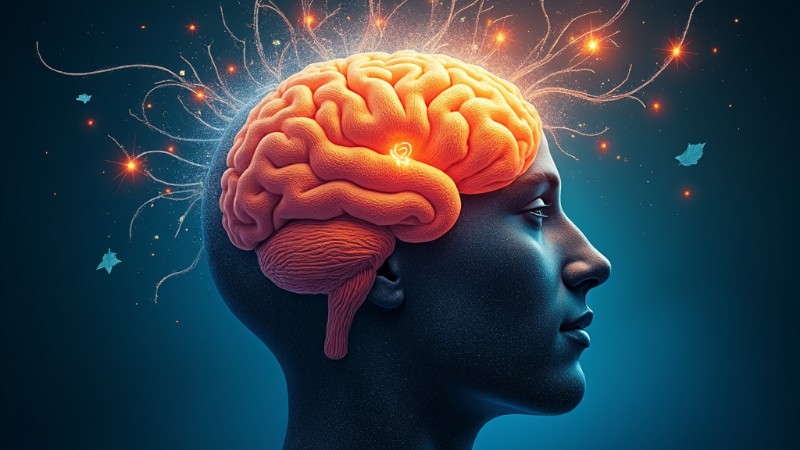As you journey through life, your brain naturally evolves, and this transformation can impact memory and cognitive function.
While it’s common to feel concerned about these changes, there’s encouraging news: numerous strategies can promote cognitive well-being and bolster long-term memory.
By embracing lifestyle adjustments and integrating brain-stimulating activities into your daily routine, you can actively enhance your mental faculties and maintain intellectual sharpness.
Discovering effective methods to nurture your brain will empower you to thrive mentally as you age.
Key Takeaways
Boosting brain health through lifestyle adjustments and mental stimulation can enhance memory and cognitive function.
- Engage in mentally demanding tasks such as solving puzzles, playing strategy games, or learning a new skill to challenge the brain and preserve mental faculties.
- Regular physical activity promotes blood flow to the brain, strengthens neural connections, and supports overall mental performance.
- Prioritize sleep, maintain a balanced diet rich in antioxidants and omega-3s, and engage in mindfulness practices like meditation to reduce stress and support cognitive health.
The importance of brain health in daily life
The brain’s capabilities are essential for navigating everyday life, enabling critical thinking, informed decision-making, and information absorption.
As you age, memory can decline due to factors like lack of sleep, high stress, and poor diet, negatively impacting mental acuity and making tasks more challenging.
Your daily choices significantly shape brain function, offering opportunities to improve memory and cognitive abilities. A balanced lifestyle enhances mental performance and memory retention, with regular exercise, proper nutrition, and neurocognitive challenges contributing to better brain health.
By prioritizing your mental well-being, you can navigate daily life more effectively.
Effective strategies for boosting brain health
Implementing effective strategies can significantly enhance brain health and memory. These approaches can help combat the natural decline associated with aging and promote cognitive vitality. Let’s look at some proven methods.
Mental stimulation
Engaging in mentally demanding tasks helps preserve and enhance mental faculties. Activities such as solving puzzles, playing strategy games, and participating in educational pursuits are excellent ways to challenge the brain. These tasks stimulate neural networks and support critical thinking skills.
Learning a new skill or hobby can also be a powerful tool for mental engagement. Whether it’s picking up a musical instrument, learning a new language, or taking up painting, these activities not only provide enjoyment but also encourage cognitive growth.
Regular physical activity
Exercise plays a pivotal role in maintaining brain health. It promotes blood flow to the brain, strengthens neural connections, and supports overall mental performance.
Regular physical activity has been linked to improved memory, reduced risk of intellectual decline, and enhanced mood.
Incorporating activities such as walking, jogging, dancing, or swimming into your routine can yield significant benefits for brain wellness.
Aim for at least 150 minutes of moderate aerobic activity per week, alongside strength training exercises.
Mindfulness and stress reduction
Mindfulness practices, such as meditation and yoga, are effective ways to reduce stress and enhance intellectual capacity.
These techniques encourage relaxation and help you focus on the present moment, leading to improved mental clarity and emotional well-being.
Practicing mindfulness can also promote better sleep patterns and reduce anxiety, which are both crucial for maintaining cognitive health. Allocating time for relaxation and self-care is essential for promoting a healthy mind.
Balanced nutrition
Consuming a well-rounded diet rich in essential nutrients is vital for optimal cognitive functioning. Key components include:
• Antioxidants: Foods such as berries, dark chocolate, and leafy greens help combat oxidative stress, which can damage brain cells and impair cognitive function.
• Omega-3 fatty acids: Found in fatty fish, walnuts, and flaxseeds, these essential fats are linked to improved memory and cognitive performance.
• Vitamins and minerals: Essential vitamins, particularly B vitamins, vitamin D, and minerals like zinc and magnesium, contribute to brain health and cognitive soundness.
Diet is so critical in the prevention of dementia because the brain relies on a steady supply of nutrients to function at its best and maintain cognitive health, memory and emotional health
Dr. Stefan Mindea, neurologist and neurosurgeon
Incorporating a variety of colorful fruits and vegetables, whole grains, lean proteins, and healthy fats into your diet will ensure your brain receives the necessary nutrients for optimal performance.
Establishing a sleep routine
Sleep deprivation can lead to memory problems, decreased concentration, and increased stress levels. Establishing a consistent sleep routine can help improve sleep quality and, in turn, support neural health.
Aim for 7-9 hours of sleep per night, and consider implementing practices such as limiting screen time before bed, creating a calming bedtime routine, and maintaining a comfortable sleep environment. Prioritizing sleep is an essential component of cognitive health.
Social connections
Staying socially connected is another crucial aspect of neurological wellness. Engaging in meaningful relationships and maintaining an active social life can enhance mental function and reduce the risk of intellectual decline.
Participating in group activities, volunteering, or simply spending time with friends and family can stimulate the mind and provide emotional support.
Building strong social networks fosters a sense of belonging and improves overall mental health.
Adding brain-stimulating activities to your routine
Engaging in brain-stimulating activities can significantly enhance mind health and memory. Below are some practical ways to incorporate these activities into your daily life:
Learning new skills
Acquiring a new skill or hobby serves as an enriching experience that challenges the brain. Consider taking a cooking class, joining a book club, or enrolling in an art course.
These activities offer enjoyment while also stimulating neural connections and fostering cognitive growth.
Solving puzzles and playing games
Activities such as crossword puzzles, Sudoku, and brain-teaser games require analytical skills and problem-solving abilities, strengthening short-term memory. These tasks engage different parts of the brain and promote mental agility.
In addition to traditional puzzles, consider exploring digital brain-training apps that offer a variety of cognitive challenges tailored to your skill level. These games can make mental workouts enjoyable and accessible.
Engaging in deep conversations
Meaningful conversations stimulate cognitive function and promote effective communication skills. Engage in discussions with friends or family members about thought-provoking topics.
This practice not only enhances social connections but also encourages critical thinking and verbal skills.
Practicing mindfulness
Incorporating mindfulness practices into your daily routine can significantly contribute to reducing stress and supporting mental clarity. Techniques such as meditation, deep breathing, and yoga can enhance focus and promote overall well-being.
Set aside time each day for mindfulness exercises, even if it’s just for a few minutes. This small commitment can lead to substantial improvements in intellectual acuity and emotional stability.
Physical activity and brain health
Regular physical activity not only supports physical health but also enhances mental performance. Engaging in aerobic exercise increases blood flow to the brain, promoting the growth of new neurons and enhancing memory.
Participate in activities you enjoy, whether it’s dancing, hiking, or cycling. The key is to stay active and make movement a regular part of your routine.
A path to enhanced cognitive function
Improving brain health is achievable through informed lifestyle choices and mental stimulation. By focusing on cognitive abilities and memory, you can enhance intellectual sharpness and protect your brain’s well-being.
Simple daily adjustments can lead to significant gains in long-term memory and mental endurance.
Strategies such as reducing stress, enhancing sleep, and engaging in brain-challenging activities support cognitive function and memory. Incorporating puzzles, games, and educational pursuits helps preserve mental abilities, while mindfulness practices like meditation reduce stress.
A balanced diet rich in antioxidants, omega-3s, and essential vitamins is vital for brain function. Additionally, maintaining a sleep routine, avoiding sugary drinks and processed foods, and fostering social connections can enhance brain health.
Engaging in activities like learning new skills and playing chess further boosts cognitive abilities.
By adopting a comprehensive approach to brain health, you can maintain mental acuity and agility throughout your life.


